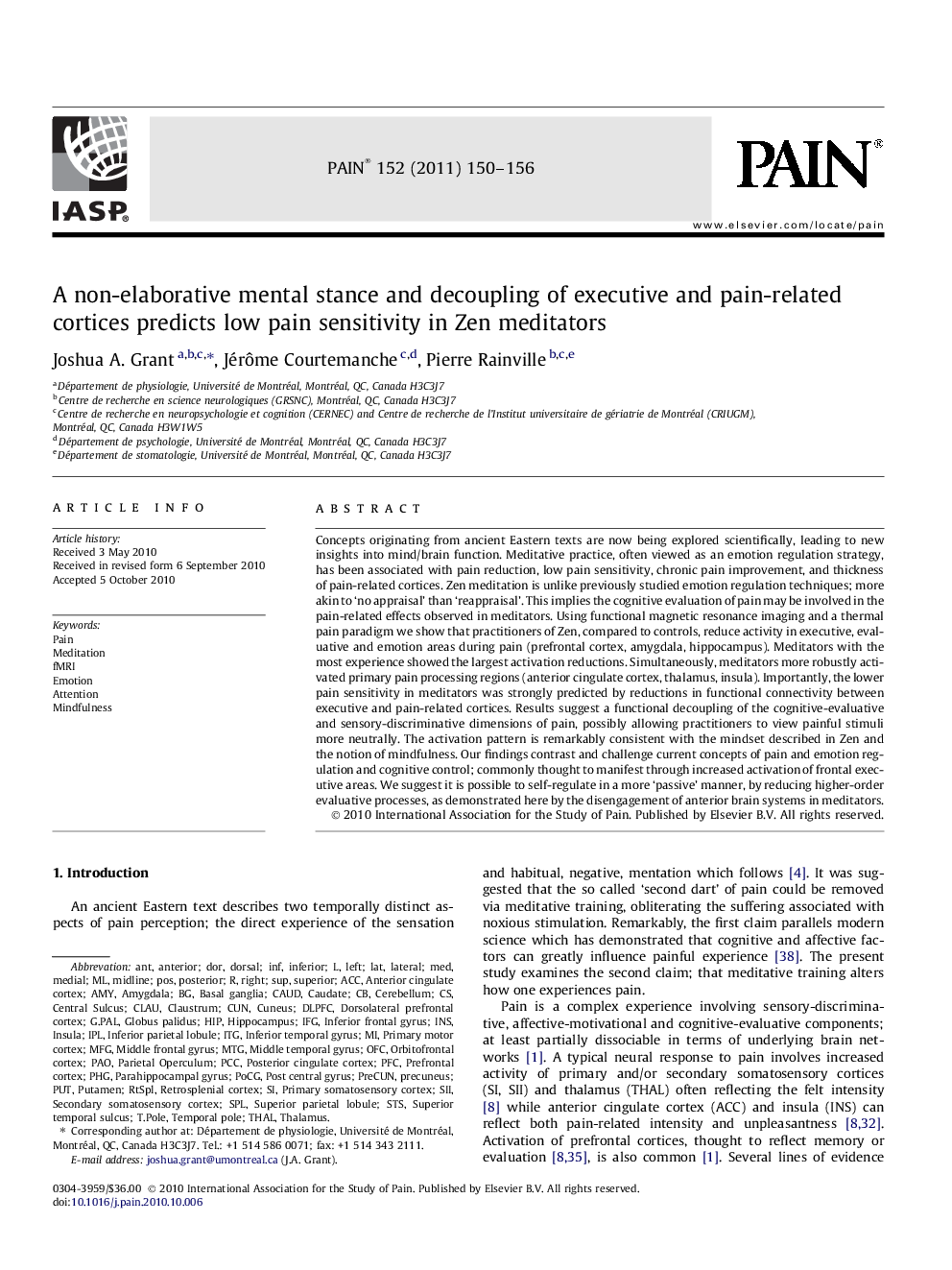| کد مقاله | کد نشریه | سال انتشار | مقاله انگلیسی | نسخه تمام متن |
|---|---|---|---|---|
| 10450937 | 918375 | 2011 | 7 صفحه PDF | دانلود رایگان |
عنوان انگلیسی مقاله ISI
A non-elaborative mental stance and decoupling of executive and pain-related cortices predicts low pain sensitivity in Zen meditators
دانلود مقاله + سفارش ترجمه
دانلود مقاله ISI انگلیسی
رایگان برای ایرانیان
کلمات کلیدی
SPLDLPFCMFGIFGOFCIPLinfmedialPHGANTSTSPAOACCINSPFCSIIPCCMTGITGparahippocampal gyrus - gyrus parahippocampalAmygdala - آمیگدال، بادامهPrecuneus - احتیاطAMY - امیCun - باMED - باsuperior - برترThalamus - تالاموسLeft - ترک کردfMRI - تصویرسازی تشدید مغناطیسی کارکردیThal - تلهAttention - توجهlateral - جانبیinsula - جزیرهMidline - خط مقدمPain - دردDOR - دردright - درستMindfulness - ذهن آگاهیLAT - سالsuperior temporal sulcus - سوزن قارچی بالاcentral sulcus - سوزن مرکزیSup - سوپPosterior - عقبdorsal - عقبbasal ganglia - عقدههای قاعدهایInferior temporal gyrus - قارچ قاعدگی پایینinferior frontal gyrus - قارچ پیشانی پایین ترanterior - قدامیPUT - قرار دادنprefrontal cortex - قشر prefrontalprimary somatosensory cortex - قشر اسموتیسنسوری اولیهorbitofrontal cortex - قشر اوربیتوفرنتالprimary motor cortex - قشر حرکتی اولیهRetrosplenial cortex - قشر رتروپلاسمیposterior cingulate cortex - قشر ساقه خلفیanterior cingulate cortex - قشر سینگولیت قدامی، کورتکس سینگولیت قدامیdorsolateral prefrontal cortex - قشر پیشانی غدد درون رحمیSecondary somatosensory cortex - قشر کمخونی ثانویهTemporal pole - قطب زمانinferior parietal lobule - لوبوئین ترموس پایینSuperior parietal lobule - لوبول ارگانیک برترclaustrum - مانعCerebellum - مخچهmeditation - مدیتیشنHIP - مفصل ران یا مفصل هیپEmotion - هیجانHippocampus - هیپوکامپ inferior - پایین ترParietal operculum - پروتئین پاریتالpos - پستPutamen - پوسته، پوتامنcaudate - کله پاچهcuneus - گروهmiddle temporal gyrus - گریش زمان متوسطmiddle frontal gyrus - گوریور پیشانی متوسط
موضوعات مرتبط
علوم زیستی و بیوفناوری
علم عصب شناسی
علوم اعصاب سلولی و مولکولی
پیش نمایش صفحه اول مقاله

چکیده انگلیسی
Concepts originating from ancient Eastern texts are now being explored scientifically, leading to new insights into mind/brain function. Meditative practice, often viewed as an emotion regulation strategy, has been associated with pain reduction, low pain sensitivity, chronic pain improvement, and thickness of pain-related cortices. Zen meditation is unlike previously studied emotion regulation techniques; more akin to 'no appraisal' than 'reappraisal'. This implies the cognitive evaluation of pain may be involved in the pain-related effects observed in meditators. Using functional magnetic resonance imaging and a thermal pain paradigm we show that practitioners of Zen, compared to controls, reduce activity in executive, evaluative and emotion areas during pain (prefrontal cortex, amygdala, hippocampus). Meditators with the most experience showed the largest activation reductions. Simultaneously, meditators more robustly activated primary pain processing regions (anterior cingulate cortex, thalamus, insula). Importantly, the lower pain sensitivity in meditators was strongly predicted by reductions in functional connectivity between executive and pain-related cortices. Results suggest a functional decoupling of the cognitive-evaluative and sensory-discriminative dimensions of pain, possibly allowing practitioners to view painful stimuli more neutrally. The activation pattern is remarkably consistent with the mindset described in Zen and the notion of mindfulness. Our findings contrast and challenge current concepts of pain and emotion regulation and cognitive control; commonly thought to manifest through increased activation of frontal executive areas. We suggest it is possible to self-regulate in a more 'passive' manner, by reducing higher-order evaluative processes, as demonstrated here by the disengagement of anterior brain systems in meditators.
ناشر
Database: Elsevier - ScienceDirect (ساینس دایرکت)
Journal: PAIN® - Volume 152, Issue 1, January 2011, Pages 150-156
Journal: PAIN® - Volume 152, Issue 1, January 2011, Pages 150-156
نویسندگان
Joshua A. Grant, Jérôme Courtemanche, Pierre Rainville,